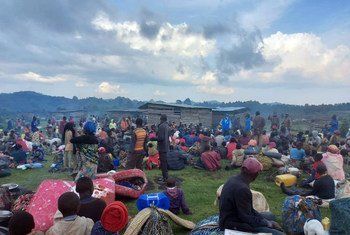UN Agencies Raise Alarm Over Hunger Crisis in DR Congo $350 Million, Call for Immediate Aid
Posted 06:50 AM, Friday November 22, 2024 2 min(s) read

Photo by: Jedidah Ephraim
KINSHASA, Nov. 22 (AGCNewsNet) – The Democratic Republic of Congo (DR Congo) faces an escalating hunger crisis, with millions affected by food insecurity driven by conflict, displacement, and rising food prices, according to the Food and Agriculture Organization (FAO) and World Food Programme (WFP).
The latest Integrated Food Security Phase Classification (IPC) report reveals that nearly all regions of DR Congo are experiencing "crisis" levels of hunger (IPC3), with 3.1 million people, including displaced individuals, in northeast provinces enduring "emergency" conditions (IPC4). The latter is characterized by acute food shortages, severe malnutrition, and a high risk of hunger-related deaths.
“In such a fragile context, the cost of inaction is truly unthinkable,” said Peter Musoko, WFP Country Director and Representative in DR Congo. He urged collaboration with the government and humanitarian organizations to address the growing needs.
The eastern regions, particularly North Kivu, Ituri, and South Kivu, are most affected, with over 6.5 million displaced people struggling to survive. Tanganyika province, ravaged by intense flooding, is now the most food-insecure area in the country.
Armed violence by around 100 militias, including the M23 group, has destabilized the region, preventing sustainable agricultural development. Bintou Keita, head of the UN Stabilization Mission in DR Congo (MONUSCO), warned the Security Council of the risk of a broader regional conflict, citing Rwanda's alleged support for M23.
Despite fertile lands and abundant water resources, the DR Congo's agricultural potential remains stifled by conflict, climate change, and a lack of rural investment. “The IPC figures speak for themselves,” said Aristide Ongone Obame, FAO representative, emphasizing the need for targeted interventions in agriculture, fisheries, and livestock to combat the impacts of climate change.
In October 2024, the WFP provided assistance to 1.95 million people but warned of a $350 million funding gap over the next six months to sustain its operations. The FAO, which has supported three million individuals out of a targeted 3.6 million this year, echoed the need for more resources.
“The humanitarian emergency is largely preventable,” FAO and WFP said in a joint statement, highlighting the urgency of securing funding to avert further loss of life.
As the humanitarian crisis deepens, UN agencies and international partners are calling for immediate and sustained global action to address the worsening situation in DR Congo.